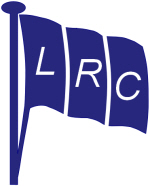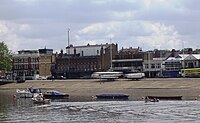London Rowing Club
 | |
 | |
| Location | Putney, England |
|---|---|
| Coordinates | 51°28′7.5″N 0°13′10″W / 51.468750°N 0.21944°W |
| Home water | Tideway |
| Founded | 1856 |
| Affiliations | British Rowing |
| Website | londonrc |
| Notable members | |
| |
London Rowing Club (LRC or colloquially 'London') is the second-oldest of the non-academic active rowing clubs on the Thames in London, United Kingdom. It was founded in 1856 by members of the long-disbanded Argonauts Club wishing to compete at Henley Royal Regatta.
It is regarded as one of the most high-performance and successful rowing clubs in Britain and its Patron is HRH Prince Philip, The Duke of Edinburgh.[2][3]
History
The club was founded in 1856 at the instigation of Herbert Playford, A. A. Casamajor and Josias Nottidge for the purpose of promoting rowing on the river Thames and winning medals at Henley Royal Regatta. These three formed part of the crew that won the Grand Challenge Cup at Henley in 1857. LRC is the second oldest of the non-academic type in London; the oldest is Poplar Blackwall and District Rowing Club having taken that status from Leander Club which gradually migrated from 1897 to 1961 to Henley on Thames in Oxfordshire.[4]
It is one of the seven founding clubs of the Remenham Club at Henley[5] and was one of five clubs which retained the right to appoint representatives directly to the Council of British Rowing.[6] This right was removed from those five clubs in September 2012.[7]
Modern day
Sophie Hosking the Gold Medal winner and Rob Williams competed for Great Britain at the London Games in 2012 in the women's lightweight double sculls and men's lightweight coxless four.
Most recently the club won the Wyfolds in 2011 and also provided half of the oarsmen in the composite international lightweight crews that won the Club Quads in 2007.
London is a High Performance Centre for lightweight rowing and has been the base for many successful international lightweights since the inception of the weight class.
Two of its members, James Lindsay-Fynn and James Clarke, competed in the Beijing Olympic Games in 2008 as part of the Lightweight Men's Coxless Fours. Nick Strange and Ben Helm competed in the lightweight double sculls and lightweight four at the Atlanta Games in 1996. The London lightweight four of 1994; Butt, Watson, Strange and Helm retain the British best time for lightweight fours of 05:48:86 (Paris, May '94)
Facilities
LRC has a substantial boathouse (altered and extended in 2008) by Putney Bridge.
Members
Former members of the club include the British racing driver, two-time Formula One World Champion and only driver to win the Triple Crown of Motorsport, Graham Hill. From 1952 to 1954, Hill rowed in twenty finals with London, usually as stroke of the crew, eight of which resulted in wins. He also stroked the London eight for the highly ranked clubs/composites cup at Henley Royal Regatta. He used the colours of the club as his motor racing helmet design, as have his descendants, Formula One World Champion racing driver son, Damon, and Formula Renault driver Josh.[8]
Current members
Current club members include international rowers for Great Britain, Ireland and Germany such as:
- James Clarke
- Danny Harte
- Phelan Hill
- Stephen Feeney
- Sophie Hosking
- James Lindsay-Fynn
- Mathilde Pauls
- Rob Williams[9]
The current chief coach is Australian silver medallist Paul Reedy.[10]
See also
References
- Water Boiling Aft: London Rowing Club, the First 150 Years 1856-2006 Author Christopher Dodd[11]
- ^ Dodd, Christopher. Water Boiling Aft: London Rowing Club, the First 150 Years 1856-2006.
- ^ http://www.londonrc.org.uk/committee.php
- ^ Cox, Richard William (2003). British Sport: A Bibliography to 2000 (Volume 2). Routledge. p. 119. ISBN 978-0-7146-5251-1.
{{cite book}}: Cite has empty unknown parameter:|coauthors=(help) - ^ Wilkes Spirit of the Times September 7, 1861
- ^ http://remenhamclub.co.uk/the-club/rules/
- ^ "Archived copy". Archived from the original on 2008-10-12. Retrieved 2008-09-22.
{{cite web}}: Unknown parameter|deadurl=ignored (|url-status=suggested) (help)CS1 maint: archived copy as title (link) - ^ "Corporate Governance Structure". British Rowing. Archived from the original on 20 January 2013. Retrieved 31 January 2013.
{{cite web}}: Unknown parameter|deadurl=ignored (|url-status=suggested) (help) - ^ "Profile: Damon Hill". Formula One Complete. Archived from the original on 2008-01-19. Retrieved 2007-10-18.
{{cite web}}: Unknown parameter|deadurl=ignored (|url-status=suggested) (help) - ^ "List of Biographies of British International Rowers". British International Rowing Office. Archived from the original on 2007-07-11. Retrieved 2007-10-18.
{{cite web}}: Unknown parameter|deadurl=ignored (|url-status=suggested) (help) - ^ Topolski, Daniel (2002-07-02). "Rowing: Reedy repaid by London club's success". The Independent. Independent News and Media Ltd. Retrieved 2007-10-18.
{{cite news}}: Cite has empty unknown parameter:|coauthors=(help) - ^ Dodd, Christopher (2006). Water Boiling Aft: London Rowing Club, the First 150 Years 1856-2006.

